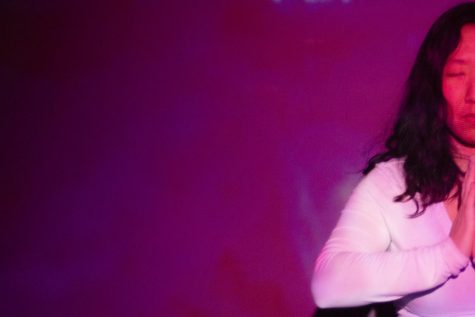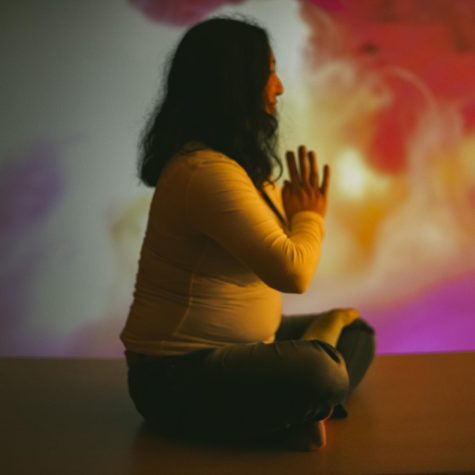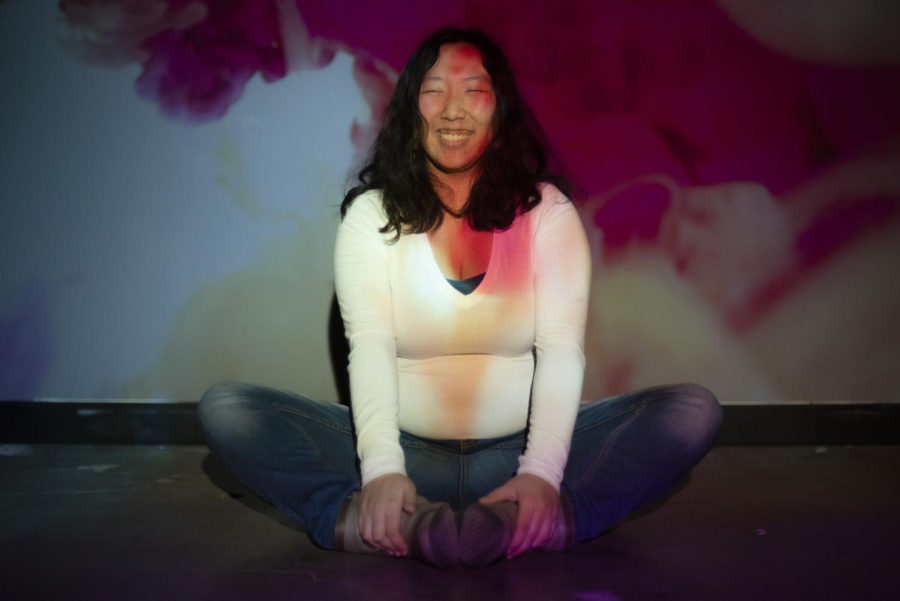- Beavers Digest / Cascades
- Beavers Digest / Cascades / Experience
- Beavers Digest / Experience
- Beavers Digest / Experience / Wellness
Alone Time vs. Lonely Time
Spending time alone (but not too much time) can allow you to recharge, reflect and reconnect with yourself
By Jess Hume-Pantuso, OMN Photographer
Local artist and Oregon State alum Julianna Souther is a lifelong dancer who uses movement, including dance and yoga as a form of self care. Movement-based self care works well for those who prefer groups or solitude.
January 26, 2022
Giving yourself meaningful time to ponder and grow may help you in a variety of ways. When you want to focus on yourself, spending time alone should be fun. How can we truly appreciate the benefits of alone time?
We are sometimes so wrapped up in everyday life that we don’t take the time to reflect on what is going on in our lives right now or what has recently transpired in the past. Taking some time to reflect on your own can make you understand yourself better in terms of self-growth. Solitude can have a lot of benefits in our lives.

Taking some time to be alone is very important for ourselves. According to Jacqueline Goldman Ph.D., a psychology instructor at Oregon State University, although we are social creatures and benefit greatly from social interaction, we also need time to reconnect with ourselves. Usually we refer to restorative alone time as solitude, or the state of being alone without loneliness. Unlike loneliness, solitude is something that we choose and is meant to be restorative and healing.
In fact, there is substantial research that indicates allowing ourselves to be “bored” in solitude actually leads to creativity, according to Haager et al. in the journal article, To be bored or not to be bored—How task‐related boredom influences creative performance. In today’s world of being constantly “connected” it is easy for us to burn out and feel, ironically, disconnected from ourselves. According to Estroff in the article, What is solitude?, allowing ourselves time to purposefully reboot our brain and reconnect to ourselves, we can enhance our ability to concentrate, engage in deep thought and better connect to our meaningful relationships.
“Spending time alone allows you to check in with yourself, such as ‘How do I feel?’ or ‘Is there anything I need to allocate my time toward?” said Hannah Ely, a fourth-year student studying design and innovation management at OSU. “It’s easy to get distracted throughout the day, and forget to practice mindfulness and self-reflection with ourselves.”
Jonathan Dressel, a fourth-year student studying computer science at OSU, thinks that taking alone time is a great way to gather your thoughts and just take a break from the chatter around you. There is a lot going on in this world and it’s healthy to spend just a little bit of time, not too much, to just focus and remember the things that are important. One way that he does this is by reading his Bible and spending time in prayer. He said this tends to help him remember the things that are important and what his purpose in this world is.
The advantages of taking alone time can be seen through reflecting on ourselves. “Spending time alone allows you to relax,” Ely said. “A day of socialization can really drain your social battery. Also, spending time alone is a great time to catch up on your personal routines, whether it be self-care or a fun hobby.”

People who spend time alone, from Dressel’s own experience and what he has seen from others, tend to be more level-headed. “When I constantly spend time with others, I miss the opportunity of really taking the time to slow down and evaluate myself,” Dressel said. “I also notice that when I spend a healthy amount of alone time, I become more aware of the character flaws that I need to work on.”
When and how long to be alone, or engage in solitude, really varies depending on the person and the circumstances. According to Goldman, some folks find they need more time to themselves to recharge, especially after a stressful event or even just a long social interaction, whereas some folks need little time to themselves to recharge and reconnect. When it becomes troublesome is when folks are spending a majority of their time alone and in a negative headspace. Solitude should be a place of growth and recharging.
Ely thinks the best time to take alone time is when we need it. Sometimes we isolate ourselves when what we really need is to talk to someone. Recognizing when alone time is beneficial versus when it’s detrimental is the greatest way to determine if alone time is good and necessary for us.
“I believe it’s okay to spend alone time when you’re burnt out or becoming impatient with others,” Dressel said. “When I become impatient with others, I either go on a long walk or read a book. My time away from others reminds me that my annoyance with them is not as big of a deal as I make it out to be. The time alone gives me a strong slap in the face that whatever complaints I have will not matter in either a week from then or even a year.”
We reap the benefits of alone time by making it a priority in our lives. Goldman said that this all boils down to knowing yourself.
“For instance, I know that I need quite a bit of time to recharge after social interactions/teaching/etc. and so I schedule my alone time with that in mind,” Goldman said. “I also communicate these needs with my spouse, so they don’t feel hurt or take it personally when I indicate I need time to myself to recharge. Usually if you feel yourself starting to burn out, easily irritable, exhausted, etc., that’s usually a pretty good indicator that your personal battery is running low and needs to recharge.”
Ely explained that her management of time in general has been scrambled since COVID-19 started. She tends to forget things or leave them on the back burner without a schedule or to-do list. That includes her alone time. “Otherwise, my morning and nightly rituals are often dedicated to the process of self-reflection and mindfulness,” Ely said.

“I usually don’t take more than an hour of alone time if I can, ” Dressel said. “I usually take 30 minutes in the morning where I read my Bible, write in my journal and then get ready for the day. At the end of the day, I try to take thirty minutes to wind down from the day’s stress.”
Goldman explained that the kinds of activities that may be done alone that are beneficial and the most effective methods to spend alone time are one thing that is imperative in alone time, or solitude, is that you are truly disconnecting.
“Yes, this means no social media, no texting, etc,” Goldman said. “Really unplugged. This doesn’t have to be for hours on end, but enough time for you to actually tap into yourself. Imagine you were having coffee with a friend who was really struggling, would you be on your phone the whole time? Treat your alone/recharge time just as you would treat a friend you were reconnecting with. Also, allow yourself to be ‘unproductive.’ College students especially are overworked and over stimulated constantly thinking about the next deadline, class, etc. Take some time to actually do nothing. Read a book for fun, listen to a podcast, play a relaxing video game (but stay off your phone!) and allow yourself time to really authentically engage in your restorative solitude.”
Ely thinks that the kinds of activities that can be done alone that benefits us is when applying to jobs, for one. She also thinks that any hobby we love that we can do alone is beneficial if we enjoy it (and it isn’t harmful). Hobbies in general are what she thinks are really important for us to engage in—alone or otherwise.
“Long walks, prayer, reading the Bible, reading and swimming are great ways to spend alone time,” Dressel said.
Goldman suggested how we can spend time alone that potentially benefits our mental health is through solitude, as it does wonders for our mental health, it can be the mental equivalent of recharging our battery. According to Long and Averill in the journal article, Solitude: An exploration of benefits of being alone, not only does it provide time for us to reconnect with ourselves and engage in deep thought, but research indicates spending time in solitude can lead to creativity, richer relationships, better concentration and enhanced spirituality. The important distinction is to ensure that the solitude is a choice and is used proactively. We are social creatures, and too much solitude can be damaging to our mental health.
“This circles back a lot to what I talked about earlier regarding mindfulness and self-reflection,” Ely said. “Sometimes we get so stressed or angry or depressed, and we don’t take the time to sit down and ask ourselves ‘Okay, I’m feeling this way. But why? And what can I do to feel better?’ Not to mention, spending time alone can often allow us to decompress and dedicate our minds to something we enjoy, which is always great for mental health and well-being.”
Dressel thinks that alone time is essential to our mental health. It can bring clarity to our emotions or thoughts and make us more aware of our own actions. Although, too much alone time can be detrimental to our mental health as the only person we focus on becomes ourselves and not others.
Especially for college students who want to succeed in terms of productivity, mental health, finances or friendships, spending time alone allows us to disconnect, recharge and reconnect to ourselves. All of those components can help us to be better students, make better decisions and cultivate richer relationships (both platonic and romantic), according to Goldman.
“Well, for starters, writing an essay alone tends to be easier when you’re not trying to have a conversation with someone,” Ely said. “Multitasking, as much as we wish we could pull it off, is just not possible. But outside of assignments, alone time can help us reorganize, restructure and rethink problems we are facing as a college student. Those definitely give a boost for our productivity—not just in academics, but overall, too.”
Dressel believes that being alone can increase productivity by refocusing our mind and clearing it of any stress. Studying with an unfocused or stressed mind can hinder our ability to understand new concepts or be creative. Without creativity and an ability to understand new concepts, studying can be near to impossible.
The effective method for taking alone time is throughout our busy schedules, Ely said. “It can be hard to find the ‘time’ for alone time. I personally find the most consistency in the mornings and nights. Refraining from social media (because is that really alone time?) and focusing on you and what makes you happy I think is the most effective way to spend alone time.”
Dressel thinks that the most effective way of spending time alone is to meditate in God’s word. It reminds us of what our purpose on this earth is.

According to Long and Averill in the journal article, Solitude: An exploration of benefits of being alone, the difference between alone time and lonely time boils down to two things: a) choice and b) mental state. Loneliness is usually not by choice and is coupled with negative thoughts or feelings of isolation (think of “time out” being used as a punishment—it is non-voluntary and is usually marked by negativity). Whereas alone time, or solitude, is usually chosen and is a constructive state where we are purposefully engaging in ourselves.
“It’s how you look at it,” Ely said. “‘Lonely time’ implies that you’re experiencing a situation where you would feel better with company, whereas ‘alone time’ is actively choosing or taking advantage of being alone.”
The main difference between alone time and lonely time is our intent with our time, according to Dressel.
“If we choose to be alone because we are truly exhausted and need to recoup from a long day, then it is alone time,” Dressel said. “If we choose to be alone because we would rather avoid socialization even though we have plenty of energy, then that would be a lonely time.”
Spending time alone can differ from being lonely. Goldman said that alone time should feel restorative, whereas loneliness feels as though you are being depleted.
“If you feel like your happiness is suffering more under time spent alone, then you’re feeling loneliness, and loneliness often really sucks. Self-reflection and mindfulness can also suck, too. But at the end of the day, it overall benefits your productivity and mental health,” Ely said.
Dressel said that spending time alone is meant for refocusing your mind and actually relaxing while being lonely is choosing to be more selfish than you need to be with your time.
Allowing oneself time alone allows you to investigate these topics without the demands and judgements that others may impose. Taking time for oneself is necessary for our personal growth and progress. Rather than caring about other people’s needs, interests and views, alone time enables us to focus on ourselves.






